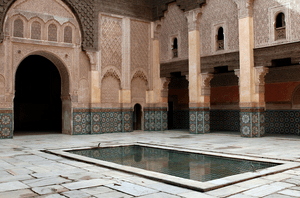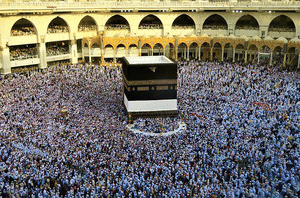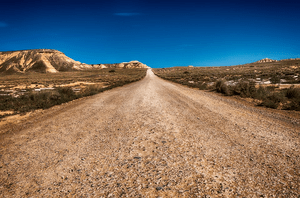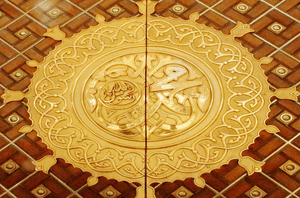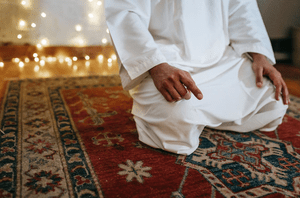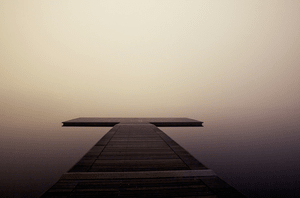Performing ṣalāh is one of the most rewarding actions. However, its fruits are not just within ṣalāh itself, but also extend to the preparations carried out beforehand. The principal preparation is wuḍū’.
Wūḍū’ is a compulsory requirement for ṣalāh. Without it, your ṣalāh is invalid.
Wuḍū, however, is not just a physical action. It is deeply spiritual. Like the majority of deeds, wuḍū’ has both an inner and an outer dimension. Whilst its outer dimension is to purify the body’s various parts from physical dirt, its inner dimension is to purify yourself from the ‘dirt’ of your sins. This is why Allah (ʿazza wa jall) says, “Indeed Allah loves those who are constantly repentant and loves those who purify themselves” (2:222).
To transform your wuḍū’ from a mere physical act of cleansing to the great act of devotion that it is, try to keep in mind at least one of the four pointers below during your wuḍū:
1. Visualise your sins being forgiven
The Messenger of Allah ﷺ said, “Whoever performs wuḍū’, and does so in an excellent manner, his sins will leave from his body, even coming out from under his nails” (Muslim). In another ḥadīth, the Prophet ﷺ explained in detail how sins leave each part of the body that is washed in wuḍū’ (Muslim).
Once, ʿUthmān b. ʿAffān (raḍiy Allāhu ʿanhu) performed wuḍū’ and then smiled. He then asked, “Do you know what made me smile?” He went on to say, “The Prophet ﷺ performed wuḍū’ like I just did, and then smiled. He then asked, ‘Do you know what made me smile?’… We replied, ‘Allah and His Messenger ﷺ know best.’ He ﷺ said, ‘Indeed when the servant performs wuḍū’, and perfects it; and then enters his prayer, and perfects it – he comes out from his prayer as he came out from his mother’s stomach without any sins’” (Aḥmad).
Whilst performing wuḍū’, imagine your sins are leaving your body. Imagine the sins committed by your hands are being forgiven as you wash them. Imagine all the foul things that you said are being washed away as you gargle. And imagine the sins that you walked towards are leaving you as you wash your feet.
2. Your status raised
The Messenger of Allah ﷺ said, “Shall I not inform you of that through which Allah forgives sins and raises ranks by?” They said, “Of course, O Messenger of Allah!” He ﷺ said, “Performing wuḍū’ thoroughly despite the difficulties, walking lots of steps towards the Masājid and waiting for one ṣalāh after the other…” (Muslim).
When it is cold, and you would rather remain warm under your duvet, remember this ḥadīth and know that Allah is elevating your rank as a result of you battling your nafs.
3. Your identity marker
Abū Hurayrah (raḍiy Allāhu ʿanhu) narrated that the Messenger of Allah ﷺ once went to the graveyard and said, “Peace be upon you, dwelling of believing people, and we will – if Allah wills – join you soon. I wish I had seen our brothers!” They said, “Are we not your brothers, O Messenger of Allah?” He ﷺ replied, “Of course. You are my Companions. My brothers are those who have not yet come. I will welcome them at the ḥawḍ (pool).” They asked, “How will you recognise those who are still yet to appear amongst your ummah, O Messenger of Allah?” He ﷺ replied, “Do you think that if a man had a horse with a white blaze and hoof along with a completely jet-black horse, will he not recognise his horse?” They said, “Certainly, O Messenger of Allah.” He ﷺ said, “They will come with radiant white faces and marks from the wuḍū’, and I will be there to welcome them at the ḥawḍ (pool)” (Muslim).
Reflect
• The Prophet ﷺ missed you and longed to see you.
• He will be waiting for you in the hereafter.
• How will he ﷺ know who you are? The body parts you regularly washed in wuḍū’ will shine, and that is how he will recognise you.
4. Eight gates of Paradise will be opened for you
The Messenger of Allah ﷺ said, “Whoever perfects his wuḍū’ and then says,
أَشْهَدُ أَنْ لَّا إِلٰهَ إِلَّا اللّٰهُ وَحْدَهُ لَا شَرِيْكَ لَهُ ، وَأَشْهَدُ أَنَّ مُحَمَّدًا عَبْدُهُ ورَسُوْلُهُ ، اَللّٰهُمَّ اجْعَلْنِيْ مِنَ التَّوَّابِيْنَ ، وَاجْعَلْنِيْ مِنَ المُتَطَهِّرِيْنَ
I bear witness that there is no god worthy of worship except Allah. He is Alone and He has no partner whatsoever. I bear witness that Muḥammad ﷺ is His slave and His Messenger. O Allah make me amongst the repentant, and make me amongst those who purify themselves.
the eight gates of Paradise will be opened for him. He may enter through whichever one he wishes” (Tirmidhī).
Likewise, the Messenger of Allah ﷺ said, “Whosoever does wuḍū’ and says,
سُبْحَانَكَ اللّٰهُمَّ وَبِحَمْدِكَ ، أَشْهَدُ أَنْ لَّا إِلٰهَ إِلَّا أَنْتَ ، أَسْتَغْفِرُكَ وأَتُوْبُ إِلَيْكَ
You are free from imperfection, O Allah, and all praise is to You. I bear witness that there is no god worthy of worship except You. I seek Your forgiveness and turn to You in repentance.
it will be recorded in a parchment and then sealed with a seal which will not be broken till the Day of Judgement” (Nasā’ī in ʿAmal al-Yawm wa al-Laylah).
Both of these duʿās will purify you from shirk (‘I bear witness that there is no god worthy of worship except Allah’) and from sins (‘make me amongst the repentant’). This is why wuḍū’ is a comprehensive form of purification – both externally and internally.
In wuḍū’, we only wash those body parts that are easy to wash, which are exposed the most, and we sin with the most.
Now that you have thoroughly purified yourself, you are ready to stand in the court of the All-Powerful Himself.
Remember to say bismillāh before starting your wuḍū’ (Abū Dāwūd).
Reflect
I will ensure my place of prayer is clean, and that my body and clothes are both clean. I will ensure that my heart is purified for meeting my Lord and conversing with Him. I will purify it through repentance. I will regret my past sins and firmly resolve to abandon them in the future.
Taḥiyyat al-Wuḍū’
On completing your wuḍū’, pray two rakʿah of taḥiyyat al-wuḍū’ in the hope that your past sins will be forgiven. The Messenger of Allah ﷺ said, “If anyone performs wuḍū’ like that of mine and offers a two rakʿah prayer during which he does not think of anything else, his past sins will be forgiven” (Bukhārī).
The Messenger of Allah ﷺ said to Bilāl (raḍiy Allāhu ʿanhu) at the time of the Fajr prayer, “O Bilāl! Inform me of the most hopeful act you have performed in Islam, for I heard your footsteps in front of me in Paradise.” Bilāl (raḍiy Allāhu ʿanhu) said, “I have not done anything more hopeful than that whenever I perform wuḍū’, be it in the day or night, I pray as much as has been decreed for me after wuḍū’ (i.e. taḥiyyat al-wuḍū’)” (Bukhārī).
When ʿAlī b. al-Ḥusayn (raḍiy Allāhu ʿanhu) would finish his wuḍū’ and get ready to start praying, he would start trembling and shaking. When this was mentioned to him, he said, “Woe to you! Do you know who I am going to stand in front of? Who I intend to converse with?”

